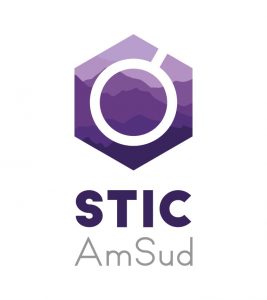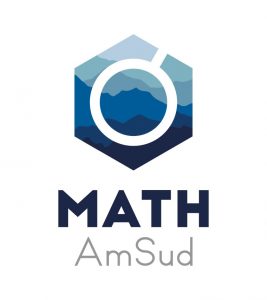For more informations about the program and submissions
Contents
STIC AmSud projects with Brazilian Universities
2024
CANARD (Computational Approaches in Neuroscience for Aging and Retinal NeuroDegeneration) with Bruno Cessac from Inria team BIOVISION and researchers from Universidade Federal do Rio do Grande do Norte, Universidade Federal do Minas Gerais, Universidad de Valparaiso and PUC Chile
DORSAL-IoT (Downlink Optimization for Robust Direct-to-Satellite LoRaWAN IoT) with Inria team AGORA AGORA- Oana Iova and partners from Brazil and Chile: Universidade Federal de Santa Catarina (UFSC), Universidad Tecnologica Metropolitana (UTEM), Universidad de Chile (UCH), Universidad Diego Portales (UDP)
2023
BIO-CIVIP (Biological control of insect vectors and insect pests) gathers researchers from Inria MUSCLEES team and from UNESP, UFF, Universidad Tecnica Federico Santa Maria (Chile), Universidad del Valle (Colombia)
DLR (Dynamic logics (reloaded)) is a research project between PUC Chile, UFF, Universidad Nacional de Cordoba and Inria team PARTOUT.
GIMMD (Graph-based analysis and understanding of image, video and multimedia data) with researchers from PUC MG, Universidad de la Republica (Uruguay) and Inria team LINKMEDIA
2022
LINT (Leveraging federated mobility learning for tactile Internet services) is a research project between UFRJ, Inria TRIBE Team , Universidad del Desarollo (Chile) and Universidad de Buenos Aires.
NetConHybSDP (Networked control of hybrid systems by semidefinite programming with applications in industry 4.0), project between UNICAMP, UFRGS, CEFET-MG and Universidad de Concepcion (Chile) and Inria DISCO team.
2020
Dylo-MPC (Dynamic Logics: Madel Theory, Proof Theory and Computational Complexity) as STIC AmSud project strengthen the collaboration between the UFRJ (Universidade Federal do Rio de Janeiro, Brazil), the UNC (Universidad Nacional de Cordoba, Argentina), and The project is run by Mario Roberto Folhadela Benevides on the Brazilian side, Lutz Strassburger and Stéphane Demri for the French one. It will be carried out from 2020 to 2022.
The project relates to the dynamic logics of Model Theory, Proof Theory and Computational Complexity. More specifically, it aims at improving the understanding of a new family of modal logics called dynamic logics.
SAQED (Scalable Approximate Query Evaluation on Document Inverted Files for GPU based Big-Data Applications) STIC AmSud project is the result of a collaboration between , the USACH (Universidad de Santiago de Chile) and the UFSC (Universidade Federal de Sao Carlos, Brazil). It has started in 2020 and will end in 2022.
The objective of the project is to collaborate on the development of an improved parallel version of the WAND ranking algorithm using the heterogeneous power of GPUs and CPUs to perform document evaluation on massive collections of documents in a scalable and efficient way.
ADMITS (Architecting Distributed Monitoring and Analytics for IoT in Disaster Scenarios) is the STIC AmSud project is born from a collaboration between the UFRN (Universidade Federal do Rio Grande do Norte, Brazil), the UDP (Universidad Diego Portales, Chile) and the USM (Universidad Técnica Federico Santa María, Chile), the UDELAR (Universidad de la República, Uruguay) and Sorbonne University, LIP6 and DELYS Inria Project-Team in France. It will last from 2020 to 2022.
This project is aimed at developing algorithms, protocols and architectures to provide a distributed computing environment to support monitoring, failure detection and analysis of IoT disaster scenarios.
2019 and earlier
GALOP (Graphs Algorithms for Optimization Problems) is the STIC AmSud project which results of the collaboration between the UFC (Universidade Federal do Ceara, Brazil), the UAI (Universidad Adolfo Ibáñez, Faculty of Engineering and Sciences, Chile) and COATI Inria Project-Team in France. It started in 2019 and ends in 2020.
The main goal of this collaboration is to study the Computational Complexity of several important problems arising in networks (routing, resources assignment…). In particular they will focus on the computation of metric or structural properties and parameters of large networks (e.g., transportation and social networks…).
MATH AmSud
2024
CHA2MAN (Stochasticity & Chaos in Multiscale Phenomena) with Mireille Bossy from Inria team CALISTO and partners from Brazil and Chile
2023
MILNE (Mixed local and nonlocal equations: analytic, numerical and probabilistic aspects) gathers researchers from UNESP, PUC Chile, Universidad de la Republica (Uruguay), Universidad Nacional de Mar del Plata (Argentina) and Inria team POEMS.
2022
GSA (Graph spectra and its applications) started in 2023 with the participation of NEO Inria team, Universidade Federal do Rio Grande do Sul, Universidade Federal Fluminense and Universidad Nacional de San Luis (Argentina)
SCIPInPDES (Stabilization, Control and Inverse Problems in PDEs) was selected in the frame of AmSud program and gathers researchers from Universidade Federal da Paraiba, Universidad Tecnica Federico Santa Maria (Chile) and Inria SPHINX Team
2020
ACIPDE (Analysis, Control and Inverse problems for Partial Differential Equations)is the MATH AmSud project which reunited the UFPB (Universidade Federal de Paraiba, Brazil), the USM (Universidad Técnica Federico Santa Maria, Chile) and SPHINX Inria Project Team in France. It has started in 2020 and will last until 2022. It will address to the topic of Analysis, Control and Inverse problems for Partial Differential Equations.
ARGO (Algebraic Real Geometry and Optimization) is the MATH AmSud project which results of a collaboration between the UBA (Universidad de Buenos Aires, Argentina), the UFC (Universidade Federal do Ceara, Brazil), the UC (Universidad de Chile, Chile), the Mathematics Laboratory LAMA, Polytechnique University and TROPICAL Inria Project-Team (France). The project has begun in 2020 and will last until 2022.
The current project addresses several key problems in real algebraic geometry, in polynomial and semi-algebraic optimization, and structural results in stress optimization and unsmoothed dynamics.
2019 and earlier
SARC (Algebraic Real Geometry and Optimization) is the MATH AmSud project resulting of the collaboration between theUAI (Universidad Adolfo Ibañez, Chile), the USP (Universidade de Sao Paulo, Brazil), the UDELAR (Universidad de la Republica Uruguay), the UNR (Universidad Nacional de Rosario, Argentina) and the Inria Project Team DIONYSOS led by Gerardo Rubino. It started in 2019 and ended in 2020.
This project focused on two main issues in the field of rare events analysis in multi-component systems with dependent components. This first one is to study existence and uniqueness of solutions of SDE and the law of the solution stochastic differential equations driven by fractional Brownian motion with non-regular coefficients- In particular, they were interested in the study of the properties of the density when the stochastic differential equations has a discontinuous coefficient or are of the power type. The second part of the proposal is deal with the Bayesian, parametric and non-parametric estimation of the parameters some statistical models related to stochastic differential de driven by fractional Brownian motion with non-regular coefficients.

